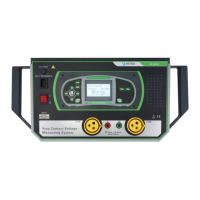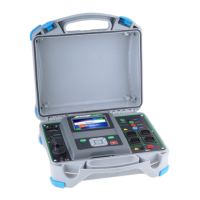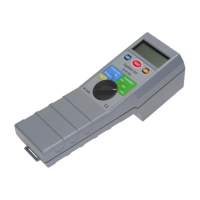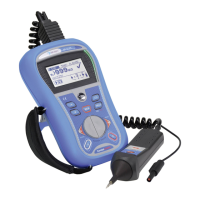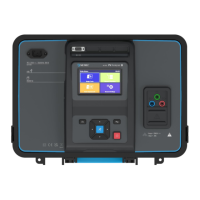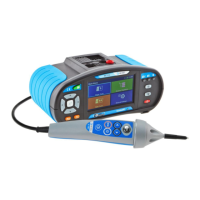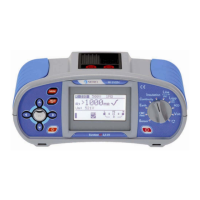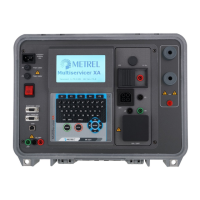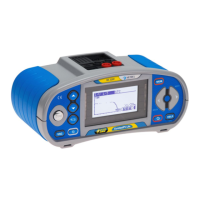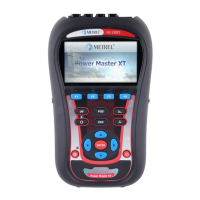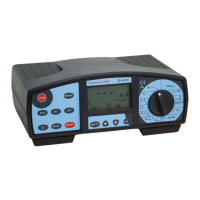Do you have a question about the METREL MI 3250 and is the answer not in the manual?
Lists the main capabilities and characteristics of the MicroOhm 10A meter.
Provides essential safety warnings and notes for operating the instrument safely and correctly.
Details the instrument's battery type, usage, and charging procedures for optimal performance.
Explains procedures to improve battery lifetime for new or long-unused cells.
Lists the regulations and standards the instrument complies with for safety and EMC.
Describes the front panel layout, including buttons, display, and their functions.
Details the instrument's terminals and physical connection points.
Details the test leads connector, including terminal identification and voltage warnings.
Illustrates and describes the connectors located on the right side of the instrument.
Illustrates and describes the connectors and battery compartment on the left side.
Lists the standard and optional accessories provided with the instrument.
Explains the different windows and elements displayed on the instrument's LCD screen.
Details the measurement result window, showing how measured resistance and other parameters are displayed.
Describes the control window used for modifying measurement parameters like mode, range, and current.
Explains the message window where warnings and status messages are displayed.
Details the icons and indicators for battery status and time display.
Explains how to turn the LCD backlight on and off using the LIGHT key.
Outlines the four main options available from the instrument's primary menu.
Describes the memory structure and options for managing stored measurement results.
Explains the procedure for saving measurement results to the instrument's internal memory.
Details how to retrieve and view previously stored measurement results from memory.
Explains how to delete individual or multiple measurement results from memory.
Describes the function to erase all stored data from the instrument's memory.
Introduces the settings menu for adjusting instrument parameters and configurations.
Explains how to change the instrument's display language.
Describes how to select the communication port (RS232 or USB) for data transfer.
Details how to set the instrument's internal date and time.
Explains how to adjust the LCD display contrast for better readability.
Describes how to use temperature compensation to adjust resistance readings to a reference temperature.
Explains how to set upper and lower limits for validating measurement results.
Shows how to access instrument details like hardware version, serial number, and calibration date.
Provides access to schematic diagrams for connecting the instrument to test objects.
Explains the four-wire Kelvin method for accurate low resistance measurements.
Outlines the process for performing resistance measurements and setting parameters.
Describes the single measurement mode for bidirectional resistance readings with thermal EMF elimination.
Explains the continuous mode for repeated bidirectional resistance measurements until stopped.
Details the automatic mode that performs measurements upon connection to the test object.
Describes the inductive mode for measuring resistance on inductive objects, including charging/discharging times.
Provides instructions for cleaning the instrument's housing safely.
Emphasizes the importance of regular calibration for maintaining technical specifications and accuracy.
Advises contacting the distributor for repairs under warranty or at any time.
Presents detailed specifications for resistance measurement, including ranges, resolution, and accuracy.
Lists specific parameters related to measurement, such as test current, power output, and voltage.
Provides general technical data about the instrument, including power, dimensions, and environmental conditions.
| Brand | METREL |
|---|---|
| Model | MI 3250 |
| Category | Measuring Instruments |
| Language | English |
